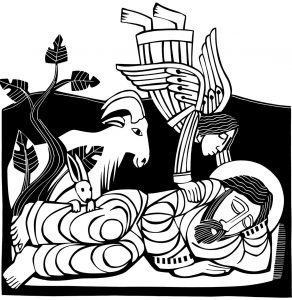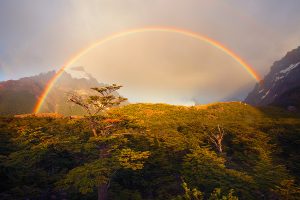This season of Lent begins with a series of stories about Covenants: holy promises between God and God’s people. Today we hear about the covenant that God makes with Noah, with Noah’s descendants, and with every living creature, following the great flood.
Many folks have warm and fuzzy feelings about the flood story in the book of Genesis. We remember hearing about it in Sunday School, seeing pictures in a children’s bible, playing with an ark. The story is memorable; Who can forget Noah, building a boat that no one can imagine a use for? Who can forget that amazing parade of animals of every kind, traveling up the gangplank? Who can forget the dove, arriving as a sign of hope to those trapped on the waves?
Unfortunately, the story of the flood also includes a message that is not easy for either children or adults to come to terms with. It is a story of divine genocide: a story of God destroying nearly all of creation. Is this really a story we want to teach our children? Is this a story we accept, as teaching us something true about God?
Thankfully, by the end of the story, there are some signs of hope; there is some evidence of good news. The waters recede. The arc returns to solid ground. And most importantly, the flood experience seems to have taught God something. Through the course of the story, God is moved from anger at the behavior of humanity to grief, regret, and compassion. Finally, God says, “As for me, I am establishing my covenant with you and your descendants, and with every living creature… never again shall there be a flood to destroy the earth…I have set my bow in the clouds, and it shall be a sign of a covenant between me and the earth.” (Genesis 9:8-13)
In the book of Genesis, there are several stories like this: stories in which God seems uncertain. Stories in which God seems to make mistakes. Stories in which God seems to be learning how to be God, through painful experience: just as each of us learns how to be who we are.
This is a compelling way to view scripture, the God-growth narrative. Another possibility also springs to mind. Perhaps in these texts, the people Israel are working out what they can believe about God. The idea that God is responsible for natural disasters, a force behind all major events, was common in the ancient world, as it is common today. It’s comforting to believe that someone is in charge, and that everything happens for a reason.
Perhaps the Israelites initially believed that God was the director of all events, including flood, famine, disaster, and tragedy. But over time, this belief was challenged. After all, this same people gave us two beautiful stories of how carefully God created all things. Could they reconcile a God who forms us in Her own image with one who would wantonly destroy us or cause us suffering?
No, the Israelites realized: the God we have come to know and worship is not like that. She not only made us in love, but continues to love us. She chooses to bind herself together with us in holy covenant, working with us to preserve creation.
Perhaps this seems like an abstract question. Why should we care about the theology of the flood story, or the beliefs of the people who recorded it? But consider: this is one of the foundational stories of our holy text. It points the way to how we can understand God’s presence and activity in tragedies that happen today.
On Wednesday, a young man named Nicholas Cruz entered Marjory Stoneman Douglas High School in Parkland, Florida with a semi-automatic weapon and killed at least 17 people. These seventeen people are, unbelievably, part of a much greater number of victims from more than 200 school shootings that have happened in the U.S. since 2012, when the Sandy Hook Massacre took place.
The response to this spreading disease of violence, this genocide of our schoolchildren, has been mind-boggling. Elected officials continue to prioritize financial contributions from the NRA over the very lives of their constituents. Gun advocates fight for the deadliest guns to be accessible to the public with virtually no regulation. The majority of us who desire some sort of change sink into a despairing complacency. In our country, we are willing to accept the ruthlessly efficient murder of one another’s children when common sense, and the example of other countries, can show us quite simply how to put a stop to it.
Where is God in this story? I refuse to believe that any one of these deaths is the desire or action of God. I refuse to believe that the terrible grief of so many communities is the desire or action of God. I refuse to believe that the disfigurement of human souls in becoming mass murderers is the desire or action of God.
Where is God in this story? The text from the Gospel of Mark offers us a different way to consider how God operates in our world. Jesus is baptized, and blessed, and then driven out into the wilderness. Here he meets Satan: the embodiment of evil. God did not create Satan. God also cannot shield Jesus from Satan; his power is real. So, Jesus spends some time keeping close company with evil as a way of preparing for his ministry. And while Jesus struggles with the forces of temptation for forty days, he is not alone. He is with the wild beasts; and the angels wait on him.
This sounds like our world. Evil exists. God is not its source, nor can God entirely protect us from it. Instead, God provides helpers to allow us to withstand evil without being subsumed by it. In this text, Wild beasts, God’s creation, reminders of the rainbow covenant. In this text, angels, God’s messengers, with presence and wisdom and hospitality.
Lent began this past week with Ash Wednesday, when we remember that we are dust, and to dust we will return. This is a somber statement, a reminder of our mortality; and also a reminder of our blessing. We were made out of dust by God our creator; and we are inheritors of that great rainbow covenant, in which God promises to treasure her creation. In life and in death, we belong to God: our spirit a part of God’s great Spirit; our flesh a part of God’s glorious creation.
All along the journeys of our lives, we are likely to meet sin and evil often. Personal temptation; personal error; harm from other individuals; harm from human systems that do violence to human spirits and human bodies and to this great creation.
Sin and evil are real. And so is God, and so are God’s messengers. Wild beasts, who remind us that we are part of a great body of blessed living creatures. Angels, who give us messages we need to hear, bread we are hungry for, company we long for. Have you been on the lookout for them? Have you caught a glimpse, or heard a voice?
I hope you will find a way in this special season of drawing close to God, who is our surest protection against the evils of despair and apathy that press close in on us. We have two resources to share from this church: An adult UCC devotional that we are running out of; more are on the way; they will be used by the Lenten bible study starting next week. Let me know if you want to get one when they come in. Also, sets of tags to record the love we witness in the world throughout the season. And downstairs, after church, you can help share some love with others, making messages for our congregation, or postcards for justice for our neighbors.
For now, please join me in prayer.
Holy God, sculptor of the mountains, womb of all creation; help us to love ourselves, and one another, and all the earth, with a love like yours: a love strong and brave enough to walk right alongside evil and persist; a love strong and brave enough to motivate compassion and a struggle for justice. With you, all things are possible. Praise be to your name. Amen.
